 The website is in construction. New files will be uploaded as soon as they are available.
The website is in construction. New files will be uploaded as soon as they are available.
MIGUEL DE GUZMÁN
Cartagena 1936 - Madrid 2004
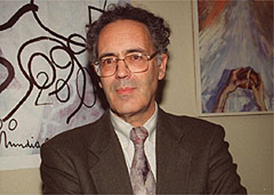
- Brief scientific biography
- Contributions to Education
- Essential Primary Bibliography
- Works on the Teaching and Popularization of Mathematics
- Essential Secondary Bibliography
- Obituaries
Brief scientific biography
Miguel de Guzmán Ozámiz was born on January 12, 1936 in Cartagena (Murcia, Spain) into a family of navy officers surrounded by tragic events: his father was executed with 157 other navy officers during the Spanish Civil War, when Miguel de Guzmán was only six months old.
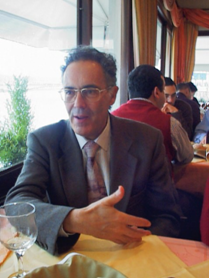
Miguel de Guzmán returned to Spain where he decided to study mathematics because he could achieve "a solid knowledge, without opinions, that you handle and gives you a sure domination over the world and the nature" and also to find "a sense of beauty that attracts you". As he wrote in a text posted on his website, "Elementary geometry was the great hobby that attracted me to the study of mathematics and has remained with me throughout my life."
He completed studies in mathematics at the University of Madrid in 1965, and also became interested in the didactics of mathematics because of the "humanistic and communicational aspect that can be done with mathematics".
He went to study analysis in Chicago after a visit of Alberto Calderón to Spain in that year and in 1968 he obtained a Ph.D. in mathematics (his doctoral dissertation was on singular integrals with generalized homogeneity) at the University of Chicago under Calderón's supervision. After earning his Ph.D. he became a professor at Washington University in St. Louis (1968-69), calling this "an immensely productive year in which I took contact with many active colleagues in the field of analysis."
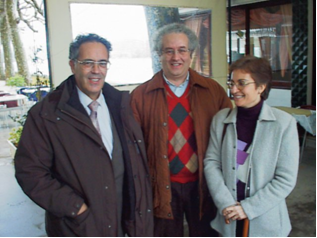
In 1971 he married Mayte Garcia-Monge and had two children: Miguel, an architect and Mayte, a physician.
In 1982 he was named a member of the Spanish Royal Academy of Mathematical, Physical and Natural Sciences, an institution where he started an ambitious program aimed at the detection and stimulation of mathematical talent in students in elementary and secondary schools. He served as president of the International Commission on Mathematical Instruction (ICMI) from 1991 to 1998, where he initiated a very important solidarity program and strongly advocated an international cooperation between mathematics researchers and researchers in mathematics education.
According to Spanish mathematicians, Miguel de Guzmán was a key figure in Spanish mathematics of the twentieth century. Eugenio Hernández and Fernando Soria wrote in the ICMI Bulletin (no. 54, June 2004) that Miguel de Guzmán was
a central figure in the development of harmonic analysis in Spain and (...) captivated the enthusiasm of several generations of mathematicians. He was an extraordinary teacher and communicator and his ideas in mathematical educationHis Internet page, constructed immediately after his department opened its server, contains numerous texts (mostly in Spanish, with a few in English) and will be maintained by his university as a tribute to its author. It can be seen at: http://ochoa.mat.ucm.es/~guzman/
have had a profound influence on the teaching of mathematics in Spain and in the world. His books, translated into several languages, have made accessible to a large audience that extraordinary activity of the human spirit known as Mathematics.
Contributions to Education
Miguel de Guzmán's commitment to education began very early and permeated all of his activities. He not only said that "teaching in any form is very attractive" but also that the "nature of the mathematical task makes it capable of stimulating important ethical aspects that we should foster in ourselves and that we should try to instil in any healthy educational system of our times."
Miguel de Guzmán thought we should have a "broad vision" of what mathematics is and reject the "somewhat empty routine" that mathematics so many times seems to entail in the classroom. He believed that mathematics is a way to understand the harmony of the universe, a science that seeks the truth, a tool that other sciences use, a creative activity with a beauty that, to use Plato's words, can only be seen with the eyes of the soul. These facets of mathematics are profoundly human and should make mathematics into one of the great axes of our educational system, if teachers are well prepared for that task; he also believed that we are failing in the preparation of mathematics teachers at all levels. In the text "Innovative trends in mathematics education" (reference?) he presented aspects that should be considered in order to change the situation, such as the exploration of applications, games, etc., and he also discussed the impact of calculators and computers, and of new areas such as discrete mathematics, etc. One of the aspects he emphasized the most is the role of history of mathematics. He maintained that history of mathematics is an important aide in:
- giving an idea of how peculiar the surge of mathematical ideas is;
- fixing the period and place of significant ideas and problems, along with their motivation;
- identifying the open problems in each period, their evolution, and how they stand at present;
- pointing out the historical connexions of mathematics with other sciences, whose interaction traditionally produced a large number of important ideas.
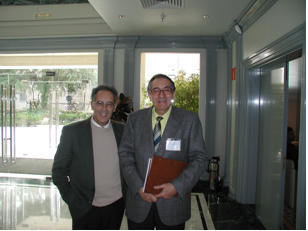
As a mathematician, he tried to convince all other mathematicians to become involved in the troubled waters of mathematics education. In 1996 he gave a talk at the 8th International Congress on Math Education (ICME 8) entitled "On the role of the mathematician in Mathematics Education", in which, admitting that "mathematical education is a rather complex task", he claimed that all mathematicians should "collaborate together in order to face its many difficult problems with efficiency", promoting "a global vision of mathematics in human culture". In this respect, mathematicians should devote their effort to several projects, namely:
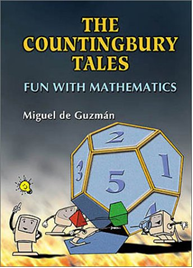
- pre-service and in-service preparation of teachers;
- research in mathematics education;
- mathematics education;
- educational treatment of young talent in mathematics.
In order to keep the ideas and the example of Miguel de Guzmán alive, the RSME, the Spanish Royal Mathematics Society, decided to launch a Summer School of Education aimed at secondary school teachers of mathematics. The first such school was held in 2005 in El Pazo de Mariñán (Bergondo, La Coruña) with the title "Computers and Mathematics Education"; the sixth was held in 2010 in the University of Burgos with the title "Contextualizing Mathematics".
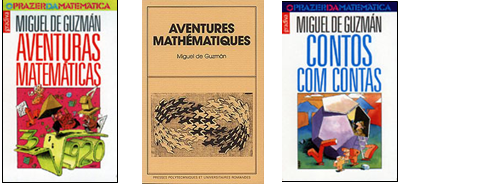
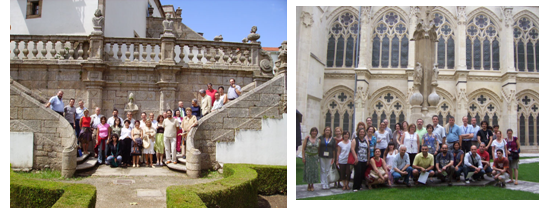
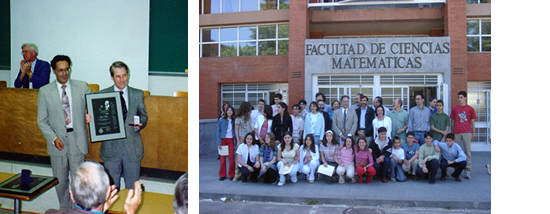
Essential Primary Bibliography
M. de GUZMAN 1975, Differentiation of Integrals in Rn, Berlin-Heidelberg-New York, Springer-Verlag.
M. de GUZMAN 1975, Ecuaciones diferenciales ordinarias: teoría de Estabilidad y Control (Ordinary differential equations: stability theory and control), Madrid, Alhambra.
M. de GUZMAN, I. PERAL, M. WALIAS 1978, Problemas de ecuaciones diferenciales ordinaries (Problems of ordinary differental equations), Madrid, Alhambra.
M. de GUZMAN, B. RUBIO 1979, Integración: Teoría y Técnicas (Integration: theory and techniques), Madrid, Alhambra.
M. de GUZMAN 1981, Real Variable Methods in Fourier Analysis, Amsterdam-New York-Oxford, North-Holland.
M. de GUZMAN 1983, Impactos del Análisis Armónico (Impact of Harmonic Analysis), Discurso de ingreso en la Real Academia Española.
M. de GUZMAN, B. RUBIO 1990-93, Problemas, conceptos y métodos del Análisis Matemático (Problems, concepts and methods of Mathematical Analysis) (3 vols), Madrid, Alhambra.
M. DE GUZMAN, M. Á. MARTÍN, M. MORÁN, M. REYES, 1993, Estructuras fractales y sus aplicaciones (Fractal structures and their applications), Madrid, Labor.
Works on the Teaching and Popularization of Mathematics
M. de GUZMAN 1977, Mirar y ver (Look and see), Madrid, Alhambra (rpt. Madrid, Nivola, 2004).
M. de GUZMAN 1983, Sobre la educación matemática (On mathematics education), Madrid, Revista de Occidente (volumen 26).
M. de GUZMAN 1984, Juegos matemáticos en la enseñanza (Mathematical games in teaching), Actas de las IV Jornadas sobre Aprendizaje y Enseñanza de las Matemáticas, IV JAEM, Sociedad Canaria de Profesores de Matemáticas "Isaac Newton", 49-85.
M. de GUZMAN 1985, Enfoque heurístico de la enseñanza de la matemática (Heuristic focus of mathematics teaching), Aspectos didácticos de matemáticas, 1, Publicaciones del Instituto de Ciencias de la Educación de la Universidad de Zaragoza, 31-46.
M. de GUZMAN 1985, Cuentos con cuentas (Stories with calculations), Barcelona, Labor (rpt. Madrid, Nivola, 2004).
M. de GUZMAN 1986, Aventuras matemáticas (Mathematical adventures), Barcelona, Labor.
M. de GUZMAN 1987, Enseñanza de la matemática a través de la resolución de problemas. Esquema de un curso inicial de preparación (Mathematics teaching through problem solving. Outline for a course for pre-service preparation), Aspectos didácticos de matemáticas, 2, Publicaciones del Instituto de Ciencias de la Educación de la Universidad de Zaragoza, 52-75.
M. de GUZMAN 1989, Tendencias actuales de la enseñanza de la matemática (Present tendencies of mathematics teaching), Studia Paedagogica. Revista de Ciencias de la Educación, 21,19-26.
M. de GUZMAN 1991, Para pensar major (To think better), Barcelona, Labor (rpt. Madrid, Pirámide, 1994).
M. de GUZMAN 1995, Aventuras matemáticas: una ventana hacia el caos y otros episodios (Mathematical adventures: a window on chaos and other episodes), Madrid, Pirámide.
M. de GUZMAN, C. ALSINA 1996, Los matemáticos no son gente seria (Mathematicians are not serious people), Barcelona, Rubes.
M. de GUZMAN 1997, El rincón de la pizarra: ensayos de visualización en Análisis Matemático (The corner of the blackboard: essays on visualization of mathematical analysis), Madrid, Pirámide.
M. de GUZMAN 1997, Del lenguaje cotidiano al lenguaje matemático (From everyday language to mathematical language), Epsilon: Revista de la Sociedad Andaluza de Educación Matemática "Thales", Nš 38, pags. 19-36.
M. de GUZMAN 2000, "Some ethical aspects in the mathematical activity", Round Table "Shaping the 21st Century", 3ECM, 11-14 July 2000, Barcelona http://ochoa.mat.ucm.es/~guzman/guzman3ecm.htm
M. de GUZMAN 2000, El sentido del ICMI hoy (The sense of ICMI today), Números, No. 43-44, 445-448.
M. de GUZMAN 2002, La experiencia de descubrir en Geometría (The experience of discovering in geometry), Madrid, Nivola.
M. de GUZMAN 2003, Un programa para detectar y estimular el talento matemático precoz en la Comunidad de Madrid (A program to detect and stimulate the precocious mathematical talent in the Madrid community), Uno: Revista de didáctica de las matematicas, No. 33, 20-33.
M. de GUZMAN 2004, Cómo hablar, demostrar y resolver en Matemáticas (How to speak, prove and solve in Mathematics), Madrid, Anaya.
M. de GUZMAN et al. 2004, Laboratorio de Matemáticas (Mathematics Laboratory), Facultad de Matemáticas de la Universidad Complutense de Madrid, http://www.mat.ucm.es/~angelin/labred/
M. de GUZMAN 2007, Enseñanza de las ciencias y la matemática (Teaching of Sciences and Mathematics), Revista iberoamericana de educación. No. 43, 19-58.
Essential Secondary Bibliography
La Gaceta de la RSME, Suplemento, 'Miguel de Guzmán Ozámiz, matemático y humanista' - Vol. 7, no. 3, septiembre-diciembre, 2004.
Textos de Miguel de Guzmán, Monografía 02 de SUMA, Madrid, 2005.
Matemáticas: Investigación y Educación. Un homenaje a Miguel de Guzmán, Universidad Complutense de Madrid, Anaya, 2005.
Boletín de la Sociedad Puig Adam de Profesores de Matemática s, Vol. 70, Madrid, Junio, 2005.
A. GARCÍA, F. GARCÍA, G. RODRÍGUEZ, A. DE LA VILLA 2005, La visualización en la obra de Miguel de Guzmán, Boletín de la Sociedad Puig Adam de Profesores de Matemáticas, Vol. 71, 12-30.
E. HERNÁNDEZ, F. SORIA 2006, A walk among the mathematical interests of Miguel de Guzmán (1936-2004), EMS Newsletter 61, 23-25. http://www.ems-ph.org/newsletter/pdf/2006-09-61.pdf
A. PéREZ SANZ, Miguel de Guzmán. El último pitagórico, DivulgaMAT,
http://divulgamat.ehu.es/weborriak/Homenajes/DeGuzman/Guzman.asp
Obituaries
T. RECIO 2004, In Memoriam - Miguel de Guzmán Ozámiz (ICMI president 1991-1998), ICMI Bulletin No. 54, 70-72.
E. HERNáNDEZ, F. SORIA 2004, Miguel de Guzmán Ozámiz (January 12, 1936 - April 14, 2004), ICMI Bulletin No. 54, 72-78.
M. CASTRILÓN, M. GASPAR 2004, On Miguel's project ESTALMAT, ICMI Bulletin No. 54, 79.
C. ANDRADAS 2004, Miguel de Guzmán Obituary, ICMI Bulletin No. 54, 80-81.
J. CARVALHO E SILVA 2004, In memoriam Miguel de Guzmán (1936-2004), Educação e Matemática, Associação de Professores de Matemática, no. 78, 17-19.
J. L. VÁZQUEZ, J. I. DÍAZ, C. ALSINA, J. E. GARCÍA, B. RUBIO, M. L. CALLEJO 2004, Miguel de Guzmán (1936-2004), SUMA, Revista sobre la enseñanza y el aprendizaje de las matemáticas, Vol. 46, pp. 5-22, Madrid, Junio.
J. CARVALHO E SILVA 2004, In memoriam: Miguel de Guzmán (1936-2004), HPM newsletter, No. 56, July, pg. 5-7.
Homenaje a Don Miguel de Guzmán, 1994, SIGMA, Revista de matemáticas, Vol. 25, pp. 7-67, Vitoria, Noviembre.
Author
Jaime Carvalho e Silva
Faculty of Science and Technology
University of Coimbra
Apartado 3008
EC Universidade
3001 - 454 Coimbra
Portugal
jaimecs@mat.uc.pt
